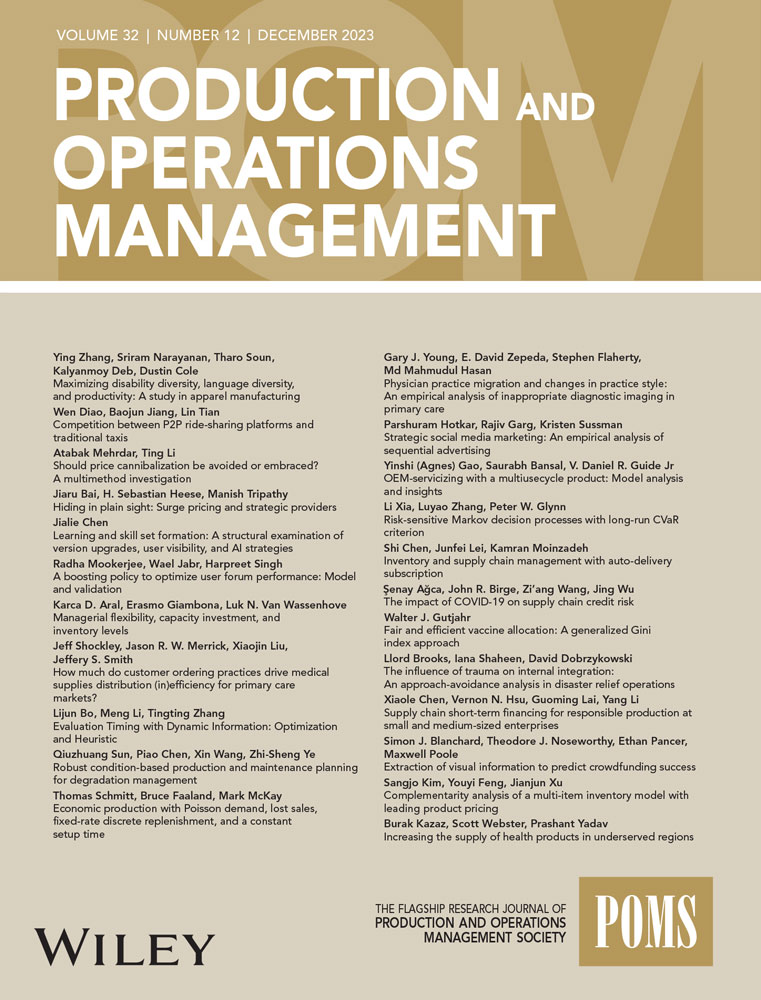Competition between P2P Ridesharing Platforms and Traditional Taxis
IF 5.1
3区 管理学
Q1 ENGINEERING, MANUFACTURING
引用次数: 0
Abstract
Abstract Over the past decade, the surge of peer‐to‐peer (P2P) ride‐sharing has significantly cut the market share and profitability for taxis, but taxis remain a major service provider in the personal transportation service industry. This paper analytically examines a market with two segments of consumers based on their travel distances, where a P2P platform and a traditional taxi company have different inconvenience costs and compete for customers through pricing. Our analysis shows that consumers’ inconvenience costs and the relative size or travel–distance heterogeneity of the two consumer segments play an important role in determining the firms’ equilibrium targeting and pricing decisions. We find that the taxi's inconvenience cost can have non‐monotonic effects on firms’ prices. An increase in the taxi's inconvenience cost can reduce both firms’ profits because it can induce both firms to lower their prices. In an extension, we show that distance‐based price discrimination (charging different unit prices based on the consumer's travel distance) can lead to win–win or lose–lose outcomes for both firms. Our results have useful managerial and regulatory implications.P2P网约车平台与传统出租车的竞争
在过去的十年中,P2P拼车服务的兴起大大降低了出租车的市场份额和盈利能力,但出租车仍然是个人交通服务行业的主要服务提供商。本文分析了一个基于出行距离的两类消费者市场,其中P2P平台和传统出租车公司具有不同的不便成本,并通过定价竞争客户。我们的分析表明,消费者的不便成本和两个消费者群体的相对规模或旅行距离异质性在决定企业的均衡目标和定价决策中起着重要作用。我们发现出租车的不便成本会对企业的价格产生非单调的影响。出租车不便成本的增加会减少两家公司的利润,因为它会诱使两家公司降低价格。在扩展中,我们表明基于距离的价格歧视(根据消费者的出行距离收取不同的单价)可能导致两家公司双赢或双输的结果。我们的研究结果对管理和监管都有有益的启示。
本文章由计算机程序翻译,如有差异,请以英文原文为准。
求助全文
约1分钟内获得全文
求助全文
来源期刊

Production and Operations Management
管理科学-工程:制造
CiteScore
7.50
自引率
16.00%
发文量
278
审稿时长
24 months
期刊介绍:
The mission of Production and Operations Management is to serve as the flagship research journal in operations management in manufacturing and services. The journal publishes scientific research into the problems, interest, and concerns of managers who manage product and process design, operations, and supply chains. It covers all topics in product and process design, operations, and supply chain management and welcomes papers using any research paradigm.
 求助内容:
求助内容: 应助结果提醒方式:
应助结果提醒方式:


